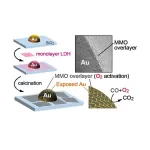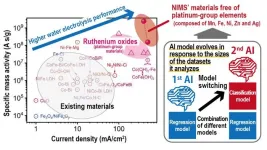(Press-News.org) We need to stop designing new AI technology just because we can, causing people to adapt practices, habits and laws to fit the new technology; instead we need to design AI that fits exactly with what we need, according to human-centred AI advocates.
Fifty experts from around the world have contributed research papers to a new book on how to make AI more ‘human-centred,’ exploring the risks — and missed opportunities — of not using this approach and practical ways to implement it.
The experts come from over 12 countries, including Canada, France, Italy, Japan, New Zealand and the UK, and more than 12 disciplines, including computer science, education, the law, management, political science and sociology.
Human-Centered AI looks at AI technologies in various contexts, including agriculture, workplace environments, healthcare, criminal justice, higher education, and offers applicable measures to be more ‘human-centred,’ including approaches for regulatory sandboxes and frameworks for interdisciplinary working.
What is human-centred AI?
Artificial intelligence (AI) permeates our lives in an ever-increasing way and some experts are arguing that relying solely on technology companies to develop and deploy this technology in a way that truly enhances human experience will be detrimental to people in the long-term. This is where human-centered AI comes in.
One of the world’s foremost experts on human-centred AI, Shannon Vallor from the University of Edinburgh in Scotland, explains that human-centred AI means technology that helps humans to flourish.
She says: “Human-centered technology is about aligning the entire technology ecosystem with the health and well-being of the human person. The contrast is with technology that’s designed to replace humans, compete with humans, or devalue humans as opposed to technology that’s designed to support, empower, enrich, and strengthen humans.”
She points to generative AI, which has risen in popularity in recent years, as an example of technology which is not human-centred – she argues the technology was created by organizations simply wanting to see how powerful they can make a system, rather than to meet a human need.
“What we get is something that we then have to cope with as opposed to something designed by us, for us, and to benefit us. It’s not the technology we needed,” she explains. “Instead of adapting technologies to our needs, we adapt ourselves to technology’s needs.”
What is the problem with AI?
Contributors to Human-Centered AI lay out their hopes, but also many concerns with AI now and on its current trajectory, without a human-centred focus.
Malwina Anna Wójcik, from the University of Bologna, Italy, and the University of Luxembourg, points out the systemic biases in current AI development. She points out that historically marginalized communities do not play a meaningful role in the design and development of AI technologies, leading to the 'entrenchment of prevailing power narratives'.
She argues that there is a lack of data on minorities or that available data is inaccurate, leading to discrimination. Furthermore, the unequal availability of AI systems causes power gaps to widen, with marginalized groups unable to feed into the AI data loop and simultaneously unable to benefit from the technologies.
Her solution is diversity in research as well as interdisciplinary and collaborative projects on the intersection of computer science, ethics, law, and social sciences. At a policy level, she suggests that international initiatives need to involve intercultural dialogue with non-Western traditions.
Meanwhile Matt Malone, from Thompson Rivers University in Canada, explains how AI poses a challenge to privacy because few people really understand how their data is being collected or how it is being used.
“These consent and knowledge gaps result in perpetual intrusions into domains privacy might otherwise seek to control,” he explains. “Privacy determines how far we let technology reach into spheres of human life and consciousness. But as those shocks fade, privacy is quickly redefined and reconceived, and as AI captures more time, attention and trust, privacy will continue to play a determinative role in drawing the boundaries between human and technology.”
Malone suggests that 'privacy will be in flux with the acceptance or rejection of AI-driven technologies', and that even as technology affords greater equality it is likely that individuality is at stake.
AI and human behaviour
As well as exploring societal impacts, contributors investigate behavioral impacts of AI use in its current form.
Oshri Bar-Gil from the Behavioral Science Research Institute, Israel, carried out a research project looking at how using Google services caused changes to self and self-concept. He explains that a data ‘self’ is created when we use a platform, then the platform gets more data from how we use it, then it uses the data and preferences we provide to improve its own performance.
“These efficient and beneficial recommendation engines have a hidden cost—their influence on us as humans,” he says. “They change our thinking processes, altering some of our core human aspects of intentionality, rationality, and memory in the digital sphere and the real world, diminishing our agency and autonomy.”
Also looking into behavioral impacts, Alistair Knott from Victoria University of Wellington, New Zealand, and Tapabrata Chakraborti from the Alan Turing Institute, University College London, UK, and Dino Pedreschi from the University of Pisa, Italy, looked at the pervasive use of AI in social media.
“While the AI systems used by social media platforms are human-centered in some senses, there are several aspects of their operation that deserve careful scrutiny,” they explain.
The problem stems from the fact that AI continually learns from user behavior, refining their model of users as they continue to engage with the platform. But users tend to click on the items the recommender system suggests for them, which means the AI system is likely to narrow a user’s range of interests as time passes. If users interact with biased content, they are more likely to be recommended that content and if they continue to interact with it, they will find themselves seeing more of it: “In short, there is a plausible cause for concern that recommender systems may play a role in moving users toward extremist positions.”
They suggest some solutions for these issues, including additional transparency by companies holding data on recommender systems to allow for greater studying and reporting on the effects of these systems, on users’ attitudes toward harmful content.
How can human-centred AI work in reality?
Pierre Larouche from the Université de Montréal, Canada, argues that treating AI as ‘a standalone object of law and regulation’ and assuming that there is ‘no law currently applicable to AI’ has left some policymakers feeling as if it is an insurmountable task.
He explains: “Since AI is seen as a new technological development, it is presumed that no law exists for it yet. Along the same lines, despite the scarcity—if not outright absence—of specific rules concerning AI as such, there is no shortage of laws that can be applied to AI, because of its embeddedness in social and economic relationships.”
Larouche suggests that the challenge is not to create new legislation but to ascertain how existing law can be extended and applied to AI, and explains: “Allowing the debate to be framed as an open-ended ethical discussion over a blank legal page can be counter-productive for policy-making, to the extent that it opens the door to various delaying tactics designed to extend discussion indefinitely, while the technology continues to progress at a fast pace.”
Benjamin Prud’homme, the Vice-President, Policy, Society and Global Affairs at Mila – Quebec Artificial Intelligence Institute, one of the largest academic communities dedicated to AI, echoes this call for confidence in policymakers.
He explains: “My first recommendation, or perhaps my first hope, would be that we start moving away from the dichotomy between innovation and regulation — that we acknowledge it might be okay to stifle innovation if that innovation is irresponsible.
“I’d tell policymakers to be more confident in their ability to regulate AI; that yes, the technology is new, but that it is inaccurate to say they have not (successfully) dealt with innovation related challenges in the past lot of people in the AI governance community are afraid of not getting things right from the get-go. And you know, one thing I’ve learned in my experiences in policymaking circles is that we’re likely not going to get it entirely right from the get-go. That’s ok.
“Nobody has a magic wand. So, I’d say the following to policymakers: Take the issue seriously. Do the best you can. Invite a wide range of perspectives—including marginalized communities and end users—to the table as you try to come up with the right governance mechanisms. But don’t let yourself be paralyzed by a handful of voices pretending that governments can’t regulate AI without stifling innovation. The European Union could set an example in this respect, as the very ambitious AI Act, the first systemic law on AI, should be definitively approved in the next few months.”
END
We must stop technology-driven AI and focus on human impact first, global experts warn
2024-03-04
ELSE PRESS RELEASES FROM THIS DATE:
NCI-MATCH cancer trial discovers a potentially broader role for an established dual HER2-blocking treatment
2024-03-04
An important discovery from the NCI-MATCH precision medicine initiative is being published today in Clinical Cancer Research, a journal of the American Association for Cancer Research. Trastuzumab-pertuzumab, a drug combination approved by the US Food and Drug Administration (FDA) to treat patients with human epidermal growth factor receptor 2 (HER2)-positive breast cancer, shrunk tumors in patients with several other types of cancer with high levels of the HER2 gene. NCI-MATCH (Molecular Analysis for Therapy Choice) is one of the first ...
Obesity a risk factor for stillbirth, especially at term
2024-03-04
Obesity is a risk factor for stillbirth, and the risk increases as pregnancy advances to term, according to a large study published in CMAJ (Canadian Medical Association Journal) https://www.cmaj.ca/lookup/doi/10.1503/cmaj.221450.
The overall risk of stillbirth in pregnancy is approximately 0.4% in Canada. "Our findings suggest that an earlier delivery date may help reduce the risk of stillbirth for pregnant people with obesity," says lead author Dr. Naila Ramji, a high-risk pregnancy specialist in Fredericton, New Brunswick, and ...
Pioneering research reveals empathetic communication can help overcome vaccine hesitancy
2024-03-04
An international study has shown for the first time how empathetic correction of misinformation among vaccine-hesitant patients can significantly improve attitudes towards vaccination – and potentially boost vaccine uptake.
The research, led by the University of Bristol, also found this new style of communication could help build and maintain a positive relationship with health professionals, increasing trust and public confidence. With the UK currently facing a growing measles outbreak, fuelled by declining rates of the Measles, ...
Rare astrolabe discovery reveals Islamic – Jewish scientific exchange
2024-03-04
The identification of an eleventh century Islamic astrolabe bearing both Arabic and Hebrew inscriptions makes it one of the oldest examples ever discovered and one of only a handful known in the world. The astronomical instrument was adapted, translated and corrected for centuries by Muslim, Jewish and Christian users in Spain, North Africa and Italy.
Dr Federica Gigante, from Cambridge University’s History Faculty, made the discoveries in a museum in Verona, Italy, and published them today in the journal Nuncius.
Dr Gigante first came across a newly-uploaded ...
Sleep apnea symptoms linked to memory and thinking problems
2024-03-03
EMBARGOED FOR RELEASE UNTIL 4 P.M. ET, SUNDAY, MARCH 3, 2024
MINNEAPOLIS – People who experience sleep apnea may be more likely to also have memory or thinking problems, according to a preliminary study released today, March 3, 2024, that will be presented at the American Academy of Neurology’s 76th Annual Meeting taking place April 13–18, 2024, in person in Denver and online. The study shows a positive association but did not determine whether sleep apnea causes cognitive decline.
Sleep ...
Nanoscale topcoat can turbocharge supported gold nanoparticle catalysts
2024-03-02
Tokyo, Japan – Researchers from Tokyo Metropolitan University have developed a way to add single nanosheets of mixed metal oxide to gold nanoparticles supported on silica to enhance their catalytic activity. Converting carbon monoxide to carbon dioxide, they found that the temperature required for the reaction was greatly reduced, with significant improvements over existing methods for coating gold/silica structures. The method paves the way for the development of a wide range of new high-performance catalysts.
Gold nanoparticles, particles less than five nanometers in diameter, are known to be excellent catalysts ...
Beyond the ink: Painting with physics
2024-03-02
Falling from the tip of a brush suspended in mid-air, an ink droplet touches a painted surface and blossoms into a masterpiece of ever-changing beauty. It weaves a tapestry of intricate, evolving patterns. Some of them resemble branching snowflakes, thunderbolts or neurons, whispering the unique expression of the artist's vision.
Okinawa Institute of Science and Technology (OIST) researchers set out to analyse the physical principles of this fascinating technique, known as dendritic painting. They took inspiration from the artwork ...
Only 9 percent of older Americans were vaccinated against RSV before the disease hit this fall and winter
2024-03-02
A new study from the Texas A&M University School of Public Health found that only 9 percent of older Americans had been vaccinated against respiratory syncytial virus (RSV) prior to this fall and winter, despite the threat of increased rates of hospitalization and deaths nationwide from the virus.
“RSV—along with COVID-19 and influenza—form the current ‘tripledemic’ found across the United States this fall and winter,” said Simon Haeder, PhD, the study’s author. “While the elderly, as well as the very young and those with chronic health conditions, typically are affected ...
Evolution-capable AI promotes green hydrogen production using more abundant chemical elements
2024-03-02
1. A NIMS research team has developed an AI technique capable of expediting the identification of materials with desirable characteristics. Using this technique, the team was able to discover high-performance water electrolyzer electrode materials free of platinum-group elements—substances previously thought to be indispensable in water electrolysis. These materials may be used to reduce the cost of large-scale production of green hydrogen—a next-generation energy source.
2. Large-scale production of green ...
In wake of powerful cyclone, remarkable recovery of Pacific island’s forests
2024-03-01
After one of the most intense cyclones in world history tore through the Pacific island of Tanna in Vanuatu, new research led by the University of Hawaiʻi at Mānoa showed the resilience of the island’s forests.
In the Pacific islands, climate change is expected to increase the intensity and frequency of cyclones, causing huge potential risks to forests and the people who depend on them. In March 2015, Cyclone Pam touched down on the island of Tanna as the strongest Pacific island cyclone in history ...





